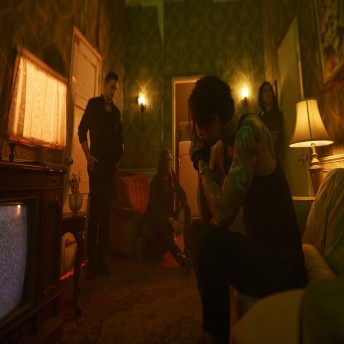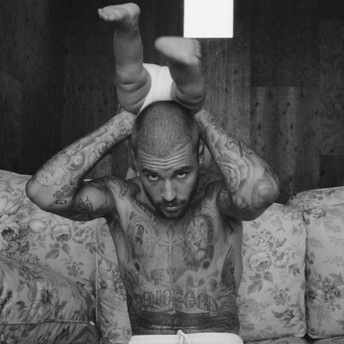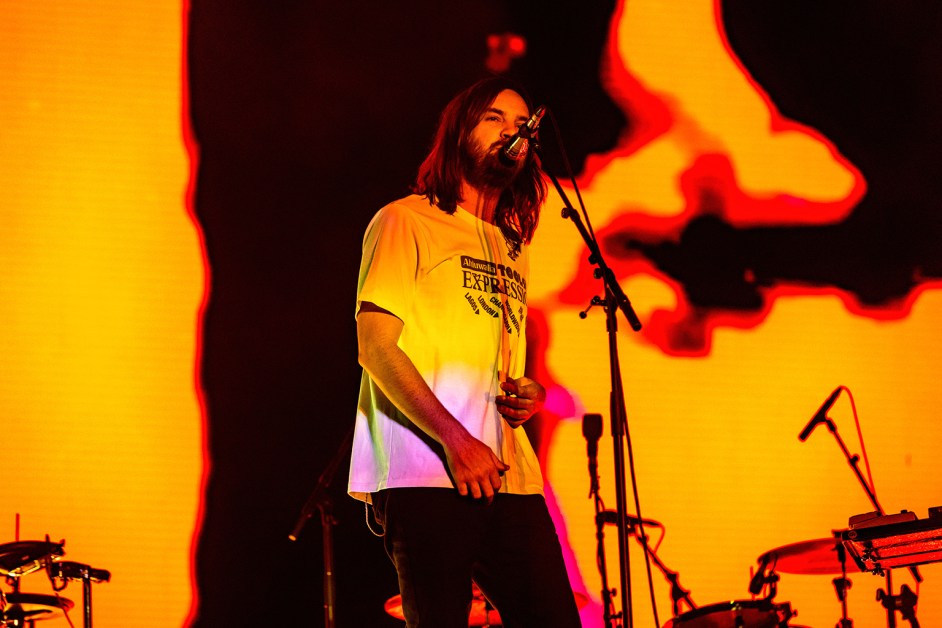Music
Page: 110
Trending on Billboard
California residents are still recovering after deadly wildfires swept through the Los Angeles area in January, so Dawes is working on a way to help out.
As announced Monday (Oct. 27), the band is teaming up with a number of famous friends for A Concert for Altadena, which will take place at the Pasadena Civic Center on the one-year mark of the disaster. Brandon Flowers of The Killers and Brad Paisley are also on the bill, as are Eric Krasno, Aloe Blacc, Jackson Browne, Judith Hill, Jenny Lewis, Mandy Moore, Stephen Stills, Everclear and Ozomatu.
Proceeds from the show will benefit the Altadena Builds Back Foundation, which works to recover and rebuild homes destroyed in the fires.
“January 7th marks a year to the day that our sweet town got ravaged by the Eaton Fire,” Dawes wrote on Instagram when sharing the news. “It’s gonna be a heavy night, but it’s going to be a beautiful one too.”
Bandmates/brothers Taylor and Griffin Goldsmith have previously been open about how the wildfires impacted them personally. A few days after the blazes broke out — and weeks before the L.A. fire department would fully be able to contain them — the latter shared on Instagram that his family had “lost everything,” including their entire house, in the catastrophe.
Taylor was also hit hard, with the fires burning down his home studio and much of Dawes’ recording equipment. At the February Grammys, the band honored the city by opening the ceremony with a performance of “I Love L.A.,” joined by Paisley, John Legend, Sheryl Crowe, Brittany Howard and St. Vincent.
See the Concert for Altadena announcement below.
Billboard’s Live Music Summit will be held in Los Angeles on Nov. 3. For tickets and more information, visit the event’s website.
Trending on Billboard
Bad Omens are hitting the road early next year for a North American headlining tour with support from Beartooth and President. The hard-rocking Virginia band announced the dates for the arena swing on Tuesday morning (Oct. 28), with the outing slated to kick off on Feb. 22 at the Delta Center in Salt Lake City, Utah.
Explore
See latest videos, charts and news
Tickets for the tour from the “Specter” band will kick off with an artist pre-sale beginning today at 12 p.m. local time, with additional pre-sales running throughout the week ahead of a general on-sale beginning on Friday (Oct. 31) at 10 a.m. local time.
Earlier this month, the Noah Sebastian-fronted band made their quickest trip to No. 1 on Billboard’s Mainstream Rock Airplay chart, with “Specter” hitting the top on the Oct. 18-dated chart after rising two spots, landing the group their second leader on the tally. “Specter” reached the pinnacle in its eighth week, easily leap-frogging the 27 weeks it took their previous No. 1, “Just Pretend,” to hit the top in 2023.
Bad Omens’ most recent proper studio album was 2022’s The Death of Peace of Mind, which was followed by 2024’s guest-heavy companion to the Bad Omens — Concrete Jungle, Volume 1 graphic novel, Concrete Jungle.
The 20-date 2026 arena tour will hit Denver, Kansas City, Detroit, Minneapolis, Toronto, Boston, Philadelphia, Nashville, Dallas, Oklahoma City and Los Angeles before winding down on March 27 at Oakland Arena in Oakland, Calif. The band will then gear up for the North American tour by kicking off their Do You Feel Love European swing on Nov. 21 in Dublin, Ireland.
Check out the dates for Bad Omens’ 2026 North American arena tour below.
Feb. 22: Salt Lake City, Utah @ Delta Center
Feb. 24: Denver, Colo. @ Ball Arena
Feb. 26: Kansas City, Mo. @ T-Mobile Center
Feb. 28: Detroit, Mich. @ Little Caesars Arena
March 2: Minneapolis, Minn. @ Target Center
March 4: Rosemont, Ill. @ Allstate Arena
March 6: Toronto, ON @ Scotiabank Arena
March 8: Laval, QC @ Place Bell
March 10: Newark, N.J. @ Prudential Center
March 11: Boston, Mass. @ TD Garden
March 13: Philadelphia, Pa. @ Xfinity Mobile Arena
March 14: Baltimore, Md. @ CFG Bank Arena
March 16: Raleigh, N.C. @ Lenovo Center
March 17: Nashville, Tenn. @ Bridgestone Arena
March 19: Dallas, Texas @ American Airlines Center
March 20: San Antonio, Texas @ Frost Bank Center
March 22: Oklahoma City, Okla. @ Paycom Center
March 24: Glendale, Ariz. @ Desert Diamond Arena
March 26: Inglewood, Calif. @ Kia Forum
March 27: Oakland, Calif. @ Oakland Arena
Billboard’s Live Music Summit will be held in Los Angeles on Nov. 3. For tickets and more information, click here.
Trending on Billboard
“As you might know, this is the first night of the tour,” Tame Impala’s Kevin Parker told a buzzing, sold-out crowd at Brooklyn’s Barclays Center on Monday night. “That means it’s a pretty epic night, and there was nowhere more epic to kick this whole shit off than New York City, obviously.
“That [also] means anything can happen,” the Aussie psych-rocker-turned-arena-star continued. “And by that, I mean for the better, but also anything can fall apart at any moment – just so you know.”
Improbably, Tame Impala has become one of modern rock’s biggest live draws. But its catalog is littered with insecurity and loneliness – from 2010 breakout single “Solitude Is Bliss” to beloved 2012 album Lonerism to “Loser,” now a Hot 100 hit from the just-released new album Deadbeat – and even after headlining festivals, producing a Dua Lipa album, and winning a Grammy, Tame mastermind Kevin Parker still clearly has some imposter syndrome.
Five albums in, Tame Impala now has a large enough catalog that tough setlist choices must be made; always known for lasers and confetti, its stage production is more complex than ever, with far more audio and visual components to possibly malfunction. And prior to Barclays on Monday, Tame Impala hadn’t played a proper headlining show in two-and-a-half years.
But Parker – outside of a mildly worn voice he attributed during the encore to an unspecified ailment – had little to worry about. Critics haven’t embraced Deadbeat in the same way as the band’s past projects, but fans greeted freshly minted hits “Dracula” and “Loser” nearly as rapturously as Tame standards like “Let It Happen” and “The Less I Know The Better.” The excitement extended to other Deadbeat material (the setlist featured 10 of its 12 tracks), which the audience responded to even more than cuts from Tame’s first two acclaimed albums, Innerspeaker and Lonerism. The band’s stage production, meanwhile, was more elaborate than ever, while still channeling the colorful, psychedelic aesthetic that’s always been its calling card.
“The only one who’s really judging you is yourself – nobody else,” Parker sings on Innerspeaker deep cut “Alter Ego,” an unexpected inclusion on Monday’s setlist. As the dance-oriented Deadbeat‘s mixed reception has proven, that’s no longer quite true, at least for Parker. But the Barclays crowd on Monday was clearly in his thrall – as those at the next three shows Tame Impala has planned at the venue this week will also surely be.
Here are some of the best moments from Tame Impala’s first Deadbeat show – and when you’re done with that, here’s the complete setlist.
Billboard‘s Live Music Summit will be held in Los Angeles on Nov. 3. For tickets and more information, click here.
A Different Crowd
Trending on Billboard Grammy-winning artist Kali Uchis, five-time Grammy nominee Kehlani, and KPop Demon Hunters’ songwriter, lead vocalist and rising star EJAE will be honored at the 17th annual ASCAP Women Behind the Music. The event is set for Wednesday, Nov. 12, in Los Angeles. Kehlani, a five-time Grammy nominee, received the Rule Breaker Award […]

Trending on Billboard
What time is it? Almost Winter Olympics time, which these days means that Public Enemy hype man Flavor Flav is picking which Team USA squads he’s going to support in the upcoming Winter Olympics.
Explore
See latest videos, charts and news
Flav, 66, who has cooked up a high-profile side gig as a rabid vocal, and financial, supporter of a number of American olympians, was announced as the official hype man for USA Bobsled and Skeleton on Monday (Oct. 27) according to the Associated Press.
“The partnership is a blessing. It’s cooler than Cool Runnings,” Flav said in reference to the beloved 1993 sport comedy loosely based on the story of the 1988 Jamaican bobsleigh team. “It’s Coolest Runnings.” The AP reported that Flav spent time with the bobsled and skeleton teams this past week, traveling to Park City, Utah, where he raced down the track in a bobsled and also wanted to try out skeleton, in which athletes roar down the icy track at speeds that can reach 80 m.p.h. or above.
In an accompanying video announcing his new gig, Flav, wearing his red, white and blue official team gear, said, “Just to let y’all know I am definitely excited to be a sponsor of the bobsled/skeleton team, boy. Yeah g, it’s going down for real! I’m a sponsor, I’m a sponsor!”
“We are thrilled to welcome Flavor Flav as an official sponsor and hype man for USA Bobsled/Skeleton,” USA Bobsled and Skeleton CEO Aron McGuire said in a statement. “It’s clear he has a genuine passion for sports and an authentic love for the USA team. Flavor Flav embodies the same grit, dedication, and pride that define our athletes, and we’re excited to have him bring that excitement to our team and fans across the country.”
While team officials wanted first-time slider Flav to start from a low spot on the track for safety reasons, the veteran rapper wasn’t having it, insisting on starting higher up as he managed to hit 67 m.p.h. on his second run. In the video after his thrilling run, Flav can be heard howling in delight at the white-knuckle ride down the icy shoot.
“Oh my gosh, he’s one of the coolest, most adventurous men that I’ve ever met,” U.S. skeleton athlete Dan Barefoot told the AP. “He was upset that he couldn’t go from higher up on the track. … I was kind of upset at how good he was. It’s a sport that takes a lot of skill, but he made it look straightforward.”
Flav plans to be with the team at the XXV Olympic Winter Games in Milan-Cortina, which will take place from Feb. 6-22.
“We have all been so hyped to have him with us,” Barefoot added. “Put aside the fact that Flav is one of the greatest hype men of all time, the energy in the room… you had people who often aren’t talking to each other high-fiving and hugging because of the experience of being around him. There’s a lot of energy and a lot of confidence around us right now.”
Not only is Flav promising to be in the stands in February, he also gave many members of the team his personal cell pone number and invited a few to join him at a Maroon 5 show over the weekend in Salt Lake City.
It won’t be Flav’s first turn as an Olympic supporter. He was all over the 2024 Paris summer games, acting as the hype man for the U.S. women’s water polo team, giving them financial support and free cruises and helping to cover rent for discus thrower Veronica Fraley. Flav has also put in his bid to be one of the official USA torchbearers at the 2028 Olympic Games in Los Angeles.
Check out video of Flav watching practice, posing with members of Team USA and ripping down the track in a bobsled and skeleton.
Trending on Billboard
Despite the challenge flags thrown by Donald Trump and some fellow Republicans, Jay-Z is 100% firm in his support for Bad Bunny playing the Super Bowl halftime show next year. Amid criticism from the President and a number of commentators on the right decrying the choice of one of the world’s most popular artists to play at the game in February, Jigga — whose Roc Nation has been tasked with booking the most-viewed musical TV performance of the year since 2019 — told TMZ that he is unwavering.
Explore
See latest videos, charts and news
When asked by a TMZ photographer about the hate coming Benito’s way, Jay reportedly told the site that the Puerto Rican superstar is way more beloved in the U.S. than some would have you think. “They love him. Don’t let them fool you,” Jay said.
After Roc Nation tapped Benito in late September, Trump reacted a week later with disdain, claiming to conservative outlet Newsmax, “I’ve never heard of him… I don’t know who he is. I don’t know why they’re doing it, it’s, like, crazy.” In addition, Homeland Security Sec. Kristi Noem threatened that U.S. Immigration and Custom Enforcement (ICE) agents will be “all over the place at the Super Bowl.
While Trump seems unlikely to watch the game, NFL commissioner Roger Goodell has no misgivings about the booking. “He’s one of the leading and most popular entertainers in the world,” Goodell told CBS Sports. “That’s what we try to achieve. It’s an important stage for us. It’s an important element to the entertainment value. It’s carefully thought through.” To be fair, the commish added, he doesn’t think the league has ever “selected an artist without some blowback or criticism.”
Turning Point USA, an ultraconservative youth organization founded by the late activist Charlie Kirk, has announced its intention to host an alternate halftime show out of protest; a line-up for that show has not yet been announced.
Though Trump claimed to have never heard of Bad Bunny, the singer’s chart bona fides speak for his broad appeal. Benito holds records as the first Latin artist to have 100 career Billboard Hot 100 songs, as well as having the first all-Spanish album to reach No. 1 on the Billboard 200 album chart (2020’s El Ultimo Tour Del Mundo). He has also tied Taylor Swift for having the most No. 1s on the Billboard Global 200 of any solo artist, has rolled up nearly 80 million Spotify listeners over his career and was ranked the most-streamed artist on Spotify three years running (2020-2022).
Super Bowl LX will air live on Feb. 8 at 6:30 p.m. ET and be broadcast on NBC and Telemundo and stream on Peacock and NFL+.
Trending on Billboard
Rapper, actor and philanthropist Ludacris is set to perform at the 2025 Baby2Baby Gala honoring tennis legend Serena Williams. The gala, presented by Paul Mitchell, will be held Saturday, Nov. 8, in Los Angeles. Baby2Baby is a national nonprofit that provides critical items to children in need across the U.S.
Previous performers at the event include 50 Cent, Snoop Dogg and Nelly.
Ludacris has amassed five No. 1 hits on the Billboard Hot 100, including two as a lead artist: “Money Maker” (featuring Pharrell) and “Stand Up” (featuring Shawnna). He has landed four No. 1 albums on the Billboard 200 and has won three Grammy Awards, including best rap album for Release Therapy, one of his No. 1 albums.
Chris “Ludacris” Bridges made a seamless transition to acting, including the role of Tej in the Fast & Furious franchise, where he was introduced in 2003’s 2 Fast 2 Furious. As a father of four girls, his latest ventures include launching KidNation, an educational platform devoted to the enrichment of children. In addition, Bridges created the animated series KARMA’S WORLD on Netflix, which is awaiting its fifth season.
Williams will receive the Giving Tree Award, which is awarded annually to a public figure who has demonstrated exceptional commitment to improving the lives of children in need. Past honorees include Charlize Theron, Salma Hayek Pinault, Kim Kardashian, Kerry Washington, Jennifer Garner, Gwyneth Paltrow, Jessica Alba, Kate Hudson, Amy Adams, Drew Barrymore, Chrissy Teigen and Vanessa Bryant.
Last year’s Baby2Baby Gala raised a record $17 million in support of Baby2Baby’s mission. In the last 14 years, Baby2Baby has distributed more than 500 million essential items, including diapers, formula and clothing.
Baby2Baby’s Disaster Relief & Emergency Response Program has responded to the needs of children in more than 100 disasters. This year, Baby2Baby announced the expansion of their initiative to combat the maternal health crisis to 15 states. To learn more about Baby2Baby, visit their site.
Trending on Billboard
Game 3 of the 2025 World Series had it all: records were set, heroes were made, and Justin Bieber was in the audience.
Bieber showed up for his beloved Blue Jays, as Toronto’s finest took on the Dodgers at Los Angeles’ Dodger Stadium.
The Canadian pop star shared a post from his prime seat, and was spotted decked-out in his Blue Jays gear as he cheered on his compatriots.
What he got was an all-time classic, and the longest World Series game in history at 6 hours and 39 minutes, tying a 2018 Dodgers vs. Red Sox outing.
Sadly, for Bieber at least, the Dodgers got the win, and the series lead, as Freddie Freeman smashed a home run in the 18th inning, for a 6-5 result. The Dodgers how hold a 2-1 advantage over the Blue Jays in this best-of-seven series, the winner crowned champions of Major League Baseball.
Explore
See latest videos, charts and news
The “Stay” singer has been busy of late, with family, music and sport commitments.
Earlier in the month, he made his debut on Twitch with a stream that included footage of the pop singer playing basketball, shooting pool with friends and teasing his upcoming 2026 Coachella headline spots.
The live feed came in from a giant warehouse space decked out with a mini half-pipe, a recording studio, ping-pong table and lounge area, and included an extended bit where JB put up short jumpers while talking about focusing on his health and “friendships, relationships, the ability to connect with each other,” all cued to Partynextdoor’s “Come and See Me.”
Bieber is a handy baller, playing three times in the NBA Celebrity Game during All-Star Weekend, winning MVP in 2011. He’s also a keen hockey player and fan, spotted riding his team the Toronto Maple Leafs in the 2025 Stanley Cup Playoffs. Last year, the National Hockey League (NHL) and Adidas collaborated with his fashion brand Drew House on designs for the 2024 NHL All-Star jersey collection.
JB’s Coachella shows are the only concerts he has locked in so far following the release of his Swag and Swag II collections, and will be his first full live shows since 2022, and first since welcoming into the world Jack Blues, his baby son with wife Hailey Bieber.
For the record, Swag (via JRC/ILH/Def Jam/Republic) debuted at No. 2 on the Billboard 200 in July, with 16 songs from it making a splash on the Billboard Hot 100 chart, let by “Daisies” at No. 2.
Ten days after dropping its latest album, ‘Deadbeat,’ the Australian psychedelic rock band staged its first proper concert since March 2023.
10/28/2025
Trending on Billboard
Halloween is nearly upon us, but Duran Duran got there first with a shadowy re-recording.
Ahead of their winter North American tour dates, the Rock And Roll Hall of Fame-inducted band swings into Fright Night with a re-imagined version of “Shadows on Your Side,” featuring original guitar parts from Andy Taylor.
The original, a punchy, polished cut from Duran Duran’s third studio album, Seven and the Ragged Tiger, is overhauled as a club-ready tune with several unexpected changes in pace.
Explore
See latest videos, charts and news
Seven and the Ragged Tiger was released in 1983, and yielded the global hits “New Moon on Monday,” “Union of the Snake” and “The Reflex,” which gave Duran Duran the first of two No. 1s on the Billboard Hot 100 and Official U.K. Singles Chart.
Seven And The Ragged Tiger is the only Duran Duran collection to lead the Official U.K. Albums Chart, and it proved to be the band’s final effort with its classic “Fab Five” lineup of Taylor/Taylor/Taylor/Rhodes/Le Bon, until Andy Taylor and Roger Taylor (the Taylors are unrelated) returned to the fold two decades later, for 2004’s Astronaut. Andy Taylor, who is battling stage 4 prostate cancer, has since departed from the band but has contributed to recent recordings.
Simon Le Bon and Co. will return to the United States for a run of dates in December 2025 and January 2026. As previously reported, the new wave legends have been in the studio together this year working on new material, including stints with longtime producer Nile Rodgers at Abbey Road in London.
The band has been on a Halloween kick since the 2023 release of Danse Macabre (via Tape Modern/BMG), a concept album gathering new compositions, reworked songs, and covers of songs by Billie Eilish, Talking Heads, The Rolling Stones, Siouxsie And The Banshees and more.
Danse Macabre peaked at No. 4 in the U.K. and spawned the Secret Oktober concert film, shot at the Encore Theatre at Wynn in Las Vegas. The Gavin Elder-directed flick is streaming on demand at StagePlayer+ until Nov. 3.
Earlier this year, the group struck a different type of collaboration by teaming up with Italian luxury perfume house Xerjoff on two unisex perfumes, NeoRio and Black Moonlight. The scents were, of course, created with Le Bon and keyboardist Nick Rhodes, along with bassist John Taylor and drummer Roger Taylor.
Stream “Shadows On Your Side” below.
North American Tour DatesDec. 30 -– Acrisure Arena, Thousand Palms, CAJan. 1 -– Fontainebleau, Las Vegas, NVJan. 2 -– Fontainebleau. Las Vagas, NVJan. 4 — Viejas Arena, San Diego, CAJan. 5 — PHX Arena, Phoenix, AZJan. 8 — Honda Center, Anaheim, CAJan. 9 — Thunder Valley Casino, Sacramento, CA

 State Champ Radio
State Champ Radio 







